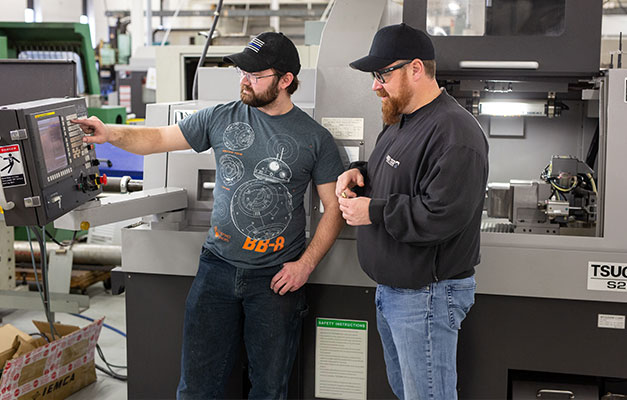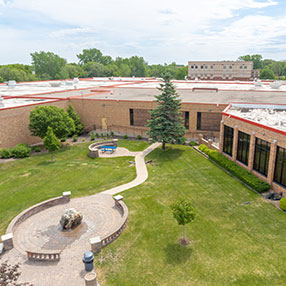The Anoka Technical College CNC Design & Manufacturing Technology Associate of Applied Science (AAS) degree and diploma programs are designed to meet our student's career goals. The programs combine technical education with general education to provide graduates with the precise skills necessary for success in manufacturing.
Why Study CNC Design & Manufacturing Technology at Anoka Tech?

Day, evening and part-time options

Hands-on training from industry experts

High growth rate compared to other careers in Minnesota
Industry & Career Outlook
Potential Jobs:
- Machinist
- Machine Operator
- Advanced Manufacturing Technician
Salary Information:
Median Wage: $34.85 per hour
Top Earners: $41.78 per hour
Information provided is for Minnesota. See current data at mn.gov/deed
Hear from our Students
What You'll Learn
Our students learn how to:
- Write and edit CNC programs
- Perform complex setups
- Basic troubleshooting of machine problems
- Cycle time reduction practices
- Fixture design and building
- Recognize areas for process improvements
They are trained to safely operate:
- Manual lathes
- Drills
- Mills
- Grinders
- CNC mills
- CNC lathes
- CNC wire
- EDM
- CNC sinker
- EDM Coordinate measuring machine
- CAD/CAM 4 & 5 axis
Other Program Info
Take a self-guided virtual tour of our campus to see what it's like to be a student at Anoka Tech. View program labs, common student spaces, campus offices and more.
Students can choose to complete the Machine Trade programs part-time. Part-time students will take longer to complete their program than students who follow the full-time sequence listed. Because every course may not be offered each semester with both day and evening options, it is important for part-time students to reach out to their faculty advisors for help in planning their long-term, part-time course sequence.
Below, new machine trades students can find first semester part-time course options. After the first semester, work with your faculty advisors to plan future semesters.
Note: In each option, you will see a choice of MACH 1171 Math for Machinists or MATH 1650 College Trigonometry. Diploma students are required to take MACH 1171 and AAS degree students are required to take MATH 1650.
First Semester Course Options
First semester part-time course options (choose option 1, 2, or 3):
Option 1: All Lecture Courses
MACH 1171 or MATH 1650 - Math for Machinist or College Trigonometry
MACH 1132 - Blueprint Reading
MACH 1121 - Metrology
MACH 1140 - CAD 1
Option 2: Lecture Courses + Milling Lab
MACH 1171 or MATH 1650 - Math for Machinist or College Trigonometry
MACH 1132 - Blueprint Reading
MACH 1121 - Metrology
MACH 1140 - CAD 1
MACH 1101 - Milling
Option 3: Lecture Courses + Lathe
MACH 1171 or MATH 1650 - Math for Machinist or College Trigonometry
MACH 1132 - Blueprint Reading
MACH 1121 - Metrology
MACH 1140 - CAD 1
MACH 1106 - Lathe
Developmental Courses
Diploma students: MACH 1171 Math for Machinists requires an Arithmetic ACCUPLACER score of 265. Students who do not meet any of the prerequisites must take the developmental course MATH 0801 Basic Math in their first semester and
then MACH 1171 in their second semester.
AAS degree students: MATH 1650 College Trigonometry requires an Advanced Algebra Functions ACCUPLACER score of 250. Students who do not meet any of the prerequisites must take the appropriate developmental math course(s) (MATH 0801 Basic Math and/or MATH 0900 Elementary Algebra) as determined by the placement chart before taking MATH 1650.
Machine Technology 1, 2, 3
Certificates
CNC Service Technician
Diploma
Quality Inspector
Certificate
Quality Technician
AAS Degree
Info for Current Students
On the first day of class all you will need is a pair of safety glasses.
We will review tools in the first few days and help you understand where better quality tools are needed. Anoka Tech also partners with several vendors to provide students with discounted tools.
Start Dates:
Fall semester: August
Spring semester: January





